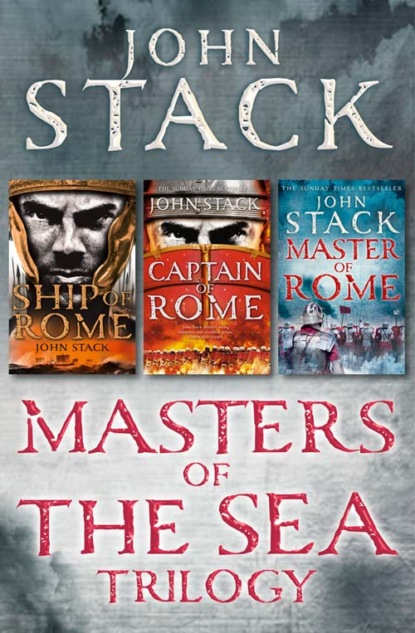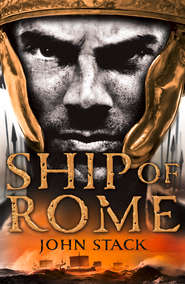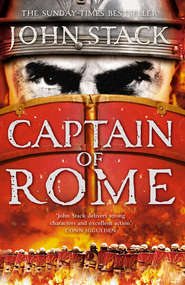По всем вопросам обращайтесь на: info@litportal.ru
(©) 2003-2025.
✖
Masters of the Sea Trilogy: Ship of Rome, Captain of Rome, Master of Rome
Автор
Год написания книги
2019
Настройки чтения
Размер шрифта
Высота строк
Поля
‘I beg your pardon, Admiral, but you want me to do what?’ Demades asked as Gisco got to the crux of his plan.
‘I want you to travel to Rome and announce to their Senate that Lipara wishes to switch allegiance to the Roman cause,’ Gisco repeated, annoyed with the awkward fool before him.
Gisco had met many like Demades before, and all had proved to be the same, big fish in small ponds. It was only when a bigger fish arrived that men like Demades realized that their power over a small city was naught when compared to the military might of an empire such as Carthage’s. Even in the face of this reality, however, Gisco had always noticed that these men still clung to the opinion that they were somehow equal to him. They were not, and in the past Gisco had been forced to draw blood to prove the point. It was only because Demades had been to Rome before and his face was known to all the traders that Gisco did not kill him now and replace him with an imposter. The traders would testify to the legitimacy of his claim to be the senior councillor of Lipara, a legitimacy that was required if the Senate was to be won over.
‘But, Admiral, Lipara has always been loyal to Carthage. We have never given the governor cause for concern. I don’t understand,’ Demades said.
‘You don’t need to understand,’ Gisco snarled. ‘You will ask the Senate to send a force to free your city, telling them that we, the Carthaginians, have strangled your trade and your people are prisoners on the island.’
‘But … but … that’s not so, Admiral. Our trade has flourished under your benevolent rule and our city has prospered. We have no wish to become a Roman possession, I assure you.’
Demades began to panic. He desperately wanted to obey the admiral, but he couldn’t understand what was being asked of him. Were the Carthaginians really going to abandon his island? If so, why would they want the Romans to take possession of Lipara? Why not just sail away?
‘You’re a fool, Demades,’ Gisco spat, losing his patience. ‘You will travel to Rome and deliver the message I have given you.’
Demades nodded, a look of puzzlement still on his face.
‘Cronus!’ Gisco shouted to the door behind Demades. The admiral’s guard commander entered and stood to attention.
‘Demades,’ Gisco continued, ‘this is Cronus. He will travel with you to Rome along with four of my personal guard. They will travel disguised as your personal guard and will be with you at all times.’
Demades looked to the towering figure of Cronus, his eyes moving from the expressionless face to the sword hanging loosely by his side. At Gisco’s words he returned his gaze to the admiral.
‘If you so much as breathe a word beyond telling the Senate the message I have outlined, Cronus will kill you, but not before he sends word to me of your betrayal. If I receive such a message, I will personally take the lives of your wife and two daughters.’
Gisco’s eyes swore the truth of the threat and Demades nearly lost control of his bladder as terror threatened to unman him. He nodded to indicate his understanding, not trusting his voice.
‘Take him away,’ Gisco ordered, and Cronus manhandled the councillor from the room.
The guard commander escorted Demades the short distance through the streets to the dockside. A trading barge was making ready to sail and Demades was bustled on board.
‘I can’t go now,’ he protested. ‘What of my family? I must speak with them.’
‘Take him below,’ was the only reply from Cronus, an order that signalled rough hands to take Demades to the main cabin.
The barge pushed off from the quayside, the helmsman setting a course that would take her north to Rome.
‘A sight to see,’ Atticus remarked to himself as the first of the twenty galleys made her way awkwardly through the breaking surf to the calmer waters beyond. It was hard to believe that it had only been two and a half weeks since construction of the fleet had begun on the once-empty beach. One by one the ships floated in the gentle swell of the tide before the oars were dropped into the shallow water and orders were issued to get under way. Given that the slaves on board had never manned oars, it was an impressive feat, and Atticus was proud of the drum masters, who had to create order from the probable chaos below decks. The successful launch of each ship was met by a cheer both from men on the beach and those on deck, and it was impossible not to feel overwhelmed at what had been achieved in so little time.
Septimus stood apart from Atticus on the aft-deck. He was dressed, as were all the marines now stationed on the galleys, in full battle gear, a show of force for the traders of Ostia. The necessities of their shared command demanded his return to the galley, and so an uneasy truce had been established between them, their argument not discussed but not forgotten either.
Atticus looked beyond the completed galleys to the beach sweeping north and a three-mile stretch of coastline where the construction frames for the next batch of fifty galleys were being completed. The number of people in the camp had exploded over the past week, and so now the fishing village of Fiumicino boasted a population greater than most cities. Atticus estimated that in less than three weeks the sea would be home to fifty more Roman galleys, all of which would need to be manned by capable crews.
As the galleys got under way, the Aquila slipped into formation, as did two galleys of the Ostia fleet, the Neptunus and the Asclepius. All three deferred to the Mars, the first ship launched and the designated flagship of the fleet. It was upon this ship that Scipio himself sailed, his statuesque figure on the foredeck visible to all those on the ships flanking the vanguard. Atticus smiled at the sight, knowing that if the Mars were to encounter a Carthaginian galley today, Scipio would immediately be knocked off his perch.
Fortuna must be smiling, Fulfidias thought, feeling favoured as his galley prepared to make the turn south to the port of Ostia. Only hours before, his dismal outlook had been as unchanged as it had been over the previous two weeks. He had stood on the aft-deck of his beached galley that morning and barked orders at his new crew, his tongue lashing all who came within range of his foul humour. That attitude had changed the moment he had answered a summons to the prefect’s tent.
He had never spoken to Tuditanus before then, but all knew of his fearsome reputation, and Fulfidias was apprehensive as to why he was being sent for. That apprehension had increased at the sight of the senior consul, Scipio himself, in attendance. They had asked him many questions, mainly about his previous sailing experience on trading galleys and the legitimacy of his business dealings in Rome. On both counts Fulfidias had spoken with pride and confidence. It was then that Scipio had announced that Fulfidias’s galley, the Salvia, would be renamed the Mars and would become the flagship of the new fleet.
Fulfidias now looked down the length of his new galley to the figure of Scipio standing alone on the foredeck. He had debated whether or not he should join the senior consul on the bow of the ship but had decided against it, remembering the cold manner that Scipio had exhibited since coming on board. Never mind, Fulfidias thought, there would be plenty of time to build a relationship with the most powerful man in the Republic. Fulfidias knew that Scipio would open new doors for him, doors that would surely reveal incredible opportunities for profit. In his mind he distinctly heard the click of Fortuna’s wheel as it turned in his favour.
Scipio ignored the light spray of water on his face and the feel of his damp toga where it was pressed against his skin by the oncoming warm breeze. He had been told the journey to Ostia would take no more than thirty minutes, and so he had decided to spend the entire time on the foredeck of the lead ship, the most prominent point in the newly formed fleet.
The sight of twenty-three galleys in the busy sea-lane drew astonished looks from the crews and passengers of other ships, and all noticed the seemingly sculpted figure of the Roman on the lead galley. Scipio knew it was only a foretaste of what he would encounter in the busy port ahead. He glanced over his shoulder at the triremes formed up behind him. They were indeed an impressive sight, one that he had never seen the like of before, and certainly one that would suggest power to all in Ostia and Rome beyond.
Scipio also noticed the three galleys of the regular fleet. They were in mid-formation, in a solid line of three abreast, their arrangement exact and controlled. Their precision was in marked contrast to the ships ahead and behind them which, it seemed, were struggling to maintain a semblance of the same order. He had earlier debated whether he should make one of the experienced galleys his flagship, but had dismissed the idea. The ‘old’ fleet was a familiar sight to the world, a fleet built by obscure and forgotten men. The new fleet was Scipio’s and, if he was going to stamp his authority and ownership on its galleys, he needed to mark them as such. Making one of the new ships his flagship was the first step in achieving his aim.
The fleet rounded the northern headland of the port of Ostia as the day reached its zenith, the springtime sun shining white from a cloudless sky, reflecting a million shards of light in the rippling waters of the bay. As more and more galleys appeared, the immediate reaction on the dockside was one of fear. The weeks of circulated rumours about the Punici horde had struck terror in the hearts of the traders, and now it seemed the enemy were striking at the very heart of the Republic.
The initial fear and consternation slowly gave way to jubilation as Roman banners flying from mastheads were recognized and all realized that the galleys approaching were not harbingers of ruin but the promised saviours that would sweep the seas for Rome. Word quickly spread, and soon almost the entire population of Ostia lined the quayside, cheering and waving the return of safety and security.
The ships fanned out as they approached the dock to create an illusion of greater numbers, so spectators on land had to turn their heads to take in the full spectacle. Two hundred yards from shore, the galleys stopped in line abreast and only the centre ship, the one that had been in the lead, continued on. While some had already noticed the tall, lone figure on the bow of the trireme, now all eyes fell on the sight as the ship made the final approach. The cheering continued, but now with a renewed focus, as the leader was identified, the man that personified the mighty strength of the assembled galleys.
With yards to go, the Mars heeled over hard to come parallel to the dock, a fluid movement belying a complex manoeuvre that the experienced galley captain made look effortless. Lines were thrown to shore and eager hands took hold to haul the ship in, the oars withdrawing to allow the ship to rest four feet from the dock. The gangway was quickly lowered and ten black-cloaked praetoriani rushed down to push the crowd back, their efforts creating a semicircular space at the foot of the gangway. Only then did Scipio appear at the head of the gangway. He paused there, taking in the frenzied cheers and shouted accolades. As the voices began to wane, he spread out his arms to call for quiet. The multitude leaned forward.
‘Citizens of Rome!’ Scipio shouted, his words carrying easily over the heads of the quieted crowd. ‘Our forefathers conceived an ambition. A hope! To spread the light of democracy from the centre of Rome to the corners of the world so all could live in peace and prosperity.
‘For hundreds of years, each generation in its turn has stepped forward to carry that torch onwards. Each generation taking its turn to expand the frontiers of the Republic. Now it is our turn, our responsibility.’
The crowd leaned ever forward, hanging on the spoken words.
‘It is not a task that promises victories or guarantees success. It is a task that requires sacrifice, and hardship, and perhaps death itself to those who carry that torch beyond the borders of our Republic.’
The crowd listened in complete silence, the only sound the lapping of the water against the dock and the cries of solitary seagulls overhead. Some recognized Scipio for who he was; most did not know his face.
‘A month ago a new kind of enemy appeared to threaten our Republic and our way of life. A savage, brutal enemy who moved with lightning speed to cut off the valiant men who carry the torch of Rome to the oppressed people of Sicily. It is a merciless enemy that, if not stopped, will surely carry the war to the gates of Rome itself!’
The crowd moaned in dismay at the thought, many recalling the terrible fear they had felt only moments before.
‘But fear not, my fellow citizens! The Senate has heard your cries and has responded. I have heard your cries and I have responded. I stand before you now on the very threshold of a new era for our glorious Republic. An era of renewed expansion and prosperity. With the fleet gathered before you, and the scores of galleys being built, I will sweep the enemy from our shores and from our seas.
‘I will free the island of Sicily and open her ports to Rome.
‘I will expand the frontiers of the Republic.
‘I, Gnaeus Cornelius Scipio, will make you, the citizens of Rome, masters of the sea!’
The crowd erupted in a tremendous roar as the words struck their hearts. A wave of sound crashed over Scipio and his own heart soared as thousands of voices were lifted in his name. He raised his clenched fist in triumph, the classic pose of the victorious, and the noise increased, the blood lust of the crowd now whipped up by the prospect of carrying the fight to the enemy.
Scipio let them cheer. His face was a mask of imperious strength as befitting his power, but inside he laughed at their gullibility. They were a mob, a mindless mob. He had called them fellow citizens but he felt completely detached from them. They were beneath him, and he resented the very fact that he was forced to breathe the same air as them.
Scipio knew, however, that he needed to harness their power – and to do so meant speaking on their level, a level that spoke of shared wealth and prosperity, of bright futures and security. He had hired half a dozen Greek rhetoricians, the best that his silver could buy, to speak on his behalf in every forum in Rome. They would reiterate Scipio’s promise to keep Rome free from the enemy threat, and ensure that his name was on every street corner in the city, on every man’s lips and in every man’s mind.
By the time the full fleet was ready, all of Rome would know who commanded the might of the Republic. Duilius would sail with the fleet but none would know his name. Only Scipio would be remembered. He would lead the fleet south and destroy the outnumbered Carthaginians. Then he would complete the conquest of Sicily.
As the crowd cheered, Scipio imagined the same sound multiplied a hundredfold. He imagined the streets of Rome lined with adoring crowds as his victorious triumph wound its way to the Curia. He imagined being given the corona graminea, the grass crown, the highest military honour the Republic could bestow, reserved only for those who rescued a beleaguered army.
Scipio looked out over the upturned faces of the cheering crowd. The people loved him as a leader because he offered them the world. In the future, when he delivered it, they would worship him as a god.









